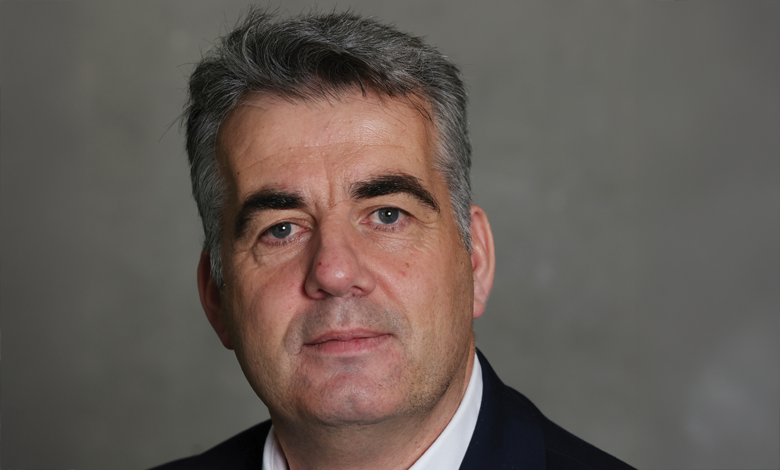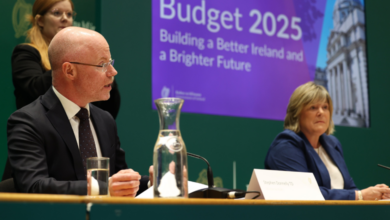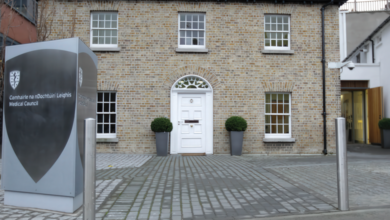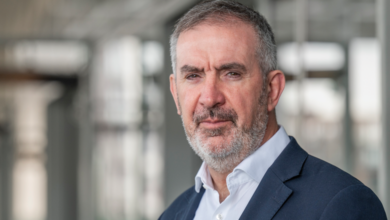Mental Health Commission: ‘Digital revolution has arrived’

The Mental Health Commission (MHC) is an example of how a public service body can keep its finger on the pulse of society, and adapt delivery of services to enhance an individual’s life experience.
The dominant strategic values driving its work are human rights; dignity and respect; person-centred mental health and decision support services; and driving improvements and access through quality, expertise and accountability.
Irish society is changing rapidly, and the design and delivery of Ireland’s public services must change with it. As a society, we are moving away from large groups of people being cared for or working in the same building – or congregated settings – to both working and receiving services in our homes and local communities. We are moving away from queuing in government offices – to expecting a swifter digital approach, with 24/7 access to services 365 days a year.
The MHC has strategically aligned with these societal changes. Its current strategic plan, Supporting Change, includes expanding the MHC remit beyond regulating mental health services into providing a broader societal value through the provision of Ireland’s first Decision Support Service. This expansion is based on collaboration with colleagues in the Department of Children, Equality, Disability, Integration and Youth, and the Department of Health. Core to the expansion is regular and deep consultation with the public, service users, family members and professionals. All of whom express a strong desire for high-quality services which ensures equity of access to person-directed, individualised mental health and decision support services.
The Chief Executive of the Mental Health Commission, John Farrelly, is clear that “the digital revolution” has arrived and he wants the MHC to be ahead of the curve, so that their clients, the professionals they interact with, and the public, receive a modern service.
“We have actively focused our resources on efficient and effective delivery,” he says. “Digital is key to this but it is also a key accelerator for promoting and vindicating the human rights of people who use mental health and decision support services.”
The MHC has a skilled and committed executive body with a highly-motivated and hard-working senior leadership team (SLT) who are determined to keep delivering on the organisation’s strategic objectives. The SLT is complemented by individual members of staff who are directly connected to the strategic and business goals through ongoing performance management and development. “I want our organisation to keep improving to deliver the best service possible to the people we serve. We work hard to create an inclusive atmosphere, where all members of staff are dedicated to public service values and delivery.”
Chief Operations Officer, Brian Gillespie, leads the corporate team which ensures the MHC is an effective, cohesive, transparently governed and agile organisation. This strong corporate spine provides shared services and a modern ICT infrastructure to support person-centred and digital-first delivery of services. This is with the aim of supporting staff to perform, while reducing red tape and regulatory burden for those that regulates, or for members of the public and professionals who use services. Its digital services were recently recognised by experts from the World Health Organization as an approach that protects and vindicates the rights of people in a real way.
Expanded remit
In April 2023, the MHC launched the Decision Support Service (DSS) for adults who may require help to exercise their right to make decisions – now or in the future. Aine Flynn was appointed by the MHC in 2017 to be Ireland’s first Director of the Decision Support Service. This digital-first service was primarily designed for use with the ordinary person in mind, and the service has already seen 19,000 people from all corners of the country opening an online account since it commenced operations, with almost 9,000 holders of these accounts aged 70 and over.
At the end of November 2024, there were more than 2,000 decision support arrangements on the searchable register maintained by the DSS. These include the new form of enduring power of attorney (which make up more than 63 per cent of all registered applications), co-decision-making agreements and decision-making representation orders made by the courts and notified to the DSS.
“The DSS is an essential service for all adults,” says Farrelly. That includes those who may have difficulties with decision-making capacity now, potentially including people with an intellectual disability, a mental illness, acquired brain injury, or dementia. But the tools for advance planning- the new enduring power of attorney and advance healthcare directive mean that it also supports all those who wish to ensure that their wishes are understood and respected, should they ever lose capacity in the future. As such it is a service for all.”
Indeed, apart from the 1,272 EPAs fully registered on the DSS system at the end of November – with almost 1,000 of them registered in the period from July to November – there are thousands more working their way through the submission and registration process, demonstrating an increasing popularity by the public to plan ahead.
Mental health
Under the Mental Health Act, the MHC has a function “to promote, encourage and foster the establishment and maintenance of high standards and good practices in the delivery of mental health services”. This includes the core objective of driving standards, improving quality, and safeguarding service users by working with all stakeholders.
“We enjoy collaborating and we will continue to work with our colleagues in the Department of Health to support the roll out of Ireland’s mental health strategy, Sharing the Vision, and updating Ireland’s mental health laws.”
With the service user at the centre of his work, the Inspector of Mental Health Services, Jim Lucey delivers programmes of inspections that target risk and promote quality and safety in Ireland’s inpatient mental health units. The publication of both national and individual centre inspection reports ensures a transparency for the public to clearly understand both the strengths and weaknesses of inpatient mental health services.
Together with his team, the MHC’s Director of Regulation, Gary Kiernan delivers programmes of standards development, registration, monitoring, and enforcement which support providers, while also holding them to account. The MHC also works and collaborates with all of the professionals, service users and providers to create standards that services can implement. Over the last few years, they have developed and implemented a new National Quality Framework for mental health services in Ireland.
The MHC is also custodian of the process for vindicating the rights of patients who are involuntarily detained. This function is led by MHC General Counsel, Orla Keane, who is one of Ireland’s foremost experts in mental health law. Coordinated by a team of highly-skilled professionals, the MHC ensures that any person who is involuntarily detained has the reason for that detention scrutinised by a tribunal that includes consultant psychiatrists, legal practitioners, and lay people. The process also ensure that every person has their own independent legal practitioner who will help vindicate their rights.
“Our work – in collaboration with service providers – shows that there has been a continued upward trend in compliance with approved centre regulations,” said Farrelly. “However, it is also important for a regulator to identify the current challenges that exist within services, such as premises and staffing. We are confident that the proposal for a capital investment programme will ensure that people in Ireland are cared for in modern premises that prioritise the safety of residents.
“Over the next five years – and on behalf of the Irish state – we will continue to operationalise a best-in-class Decision Support Service, and we will work with government, the people using services, and clinicians and providers to strengthen the standards, quality and regulatory infrastructure that protects human rights and further improve mental health service quality in this country.”
T: 01 6362400
W: www.mhcirl.ie







